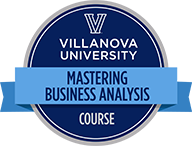Who Should Register?
Managers and professionals who have taken the Essentials of Business Analysis course and want to continue to strengthen their business analysis skills and enhance the flow of information within their organizations. The course is tailored to students and professionals at any stage of their careers, with either a business or non-business background.
Some common roles associated with business analysis are:
- Project management
- Product management
- Quality assurance
- Change management
- Design
- Training


